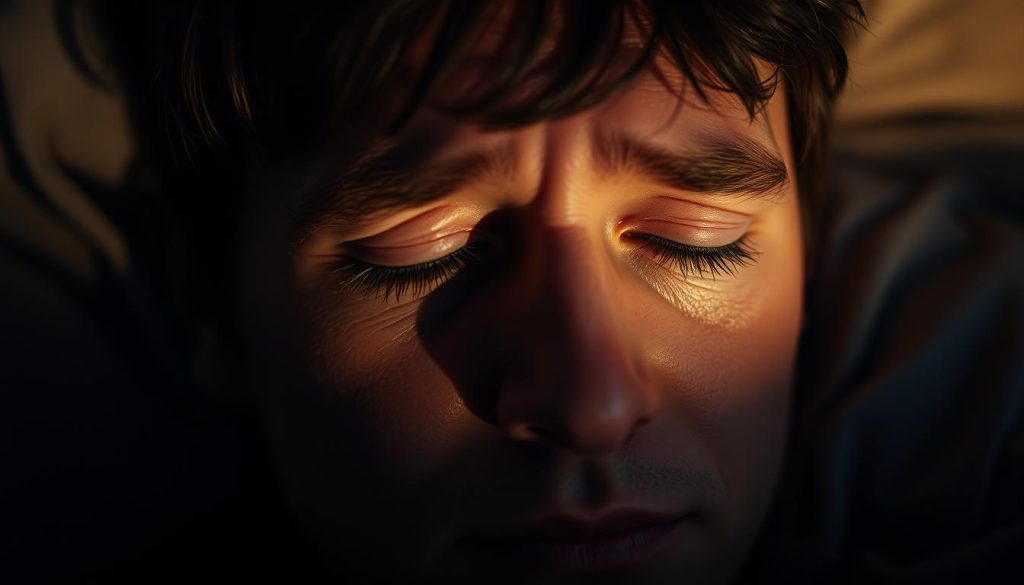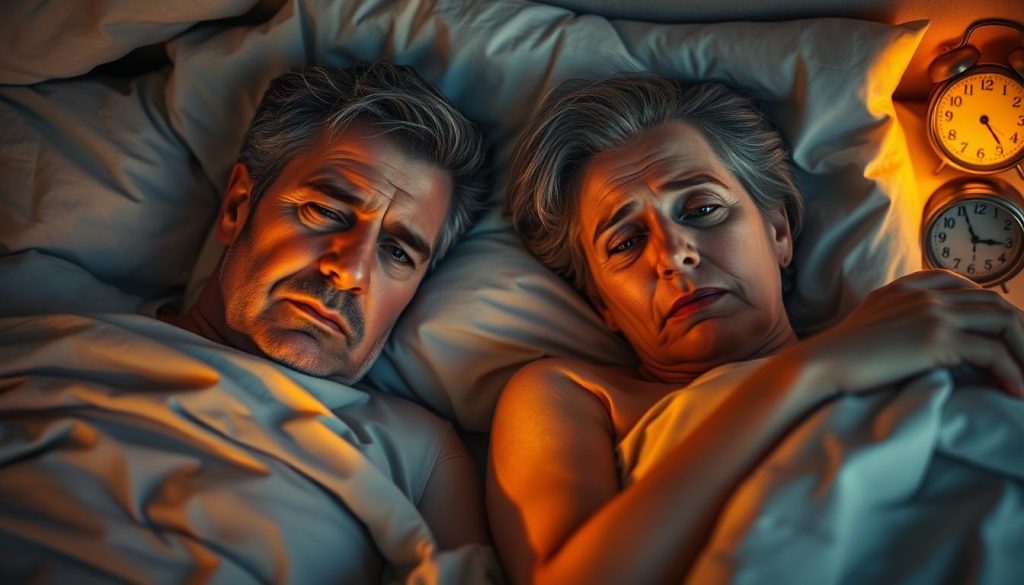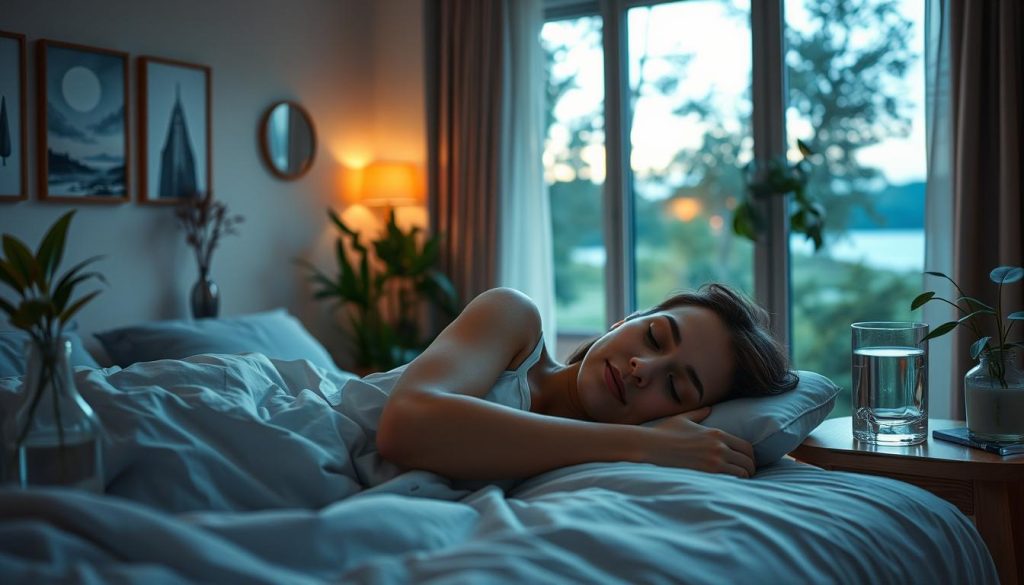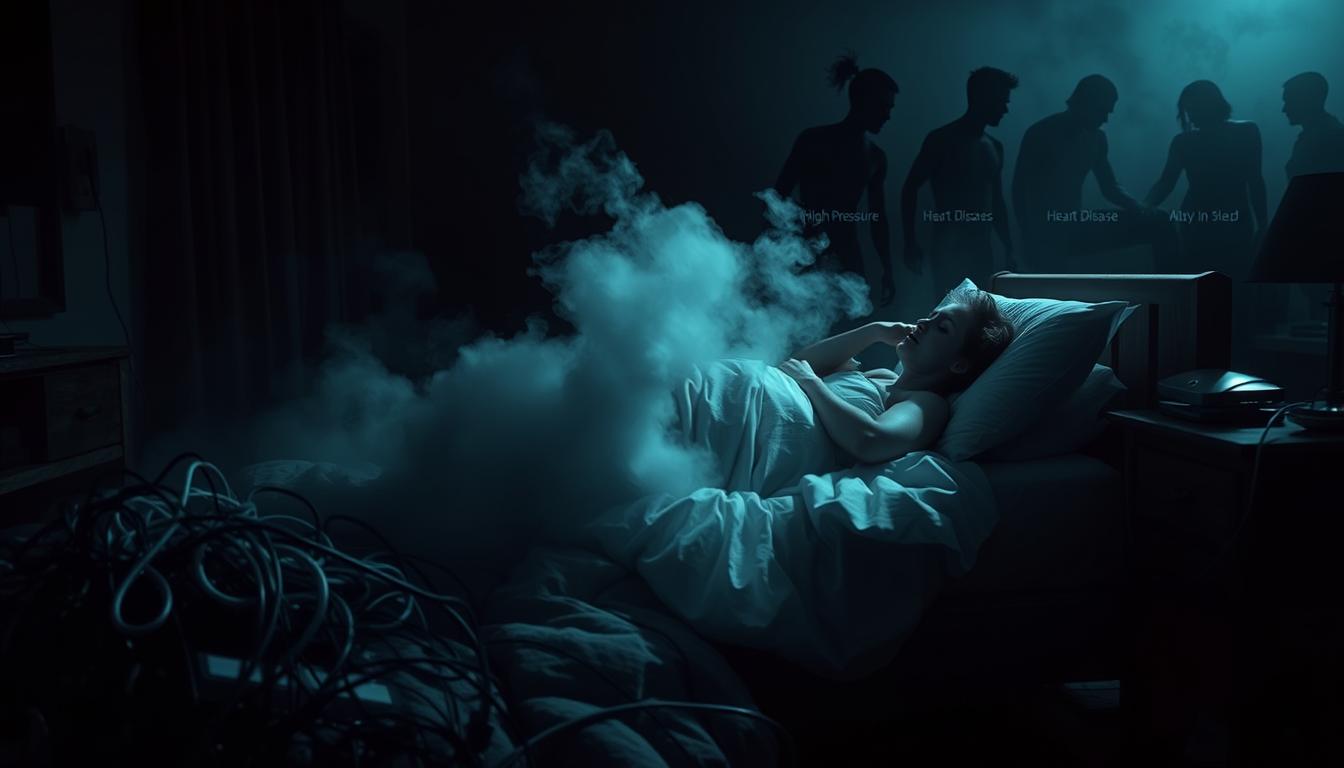In today’s fast-paced world, it’s crucial to know the dangers of sleep deprivation. Many people ignore the risks of poor sleep for the sake of work or fun. But, not getting enough sleep can harm your health and well-being.
This article will show why we need to fight sleep deprivation. It also provides tips on how to sleep better.
Understanding Sleep Deprivation
Lack of sleep is a big problem for millions every day. It’s important to define sleep deprivation and look at its many signs and causes.
What is Sleep Deprivation?
Define sleep deprivation as not getting enough sleep or poor sleep quality. It can be short-term or long-term. Short-term might happen after one bad night, while long-term is a constant fight for good sleep.
Common Causes of Sleep Deprivation
Knowing the sleep deprivation causes helps us understand why it’s hard for many to sleep well. Several things can lead to this:
- Stress: High stress from work, personal issues, or big life changes can make it hard to sleep.
- Lifestyle Choices: Using electronics before bed, irregular sleep times, and drinking caffeine or alcohol can mess with sleep.
- Medical Conditions: Problems like insomnia, sleep apnea, and restless leg syndrome can also disrupt sleep.
These sleep deprivation causes show how daily life and health issues can lead to sleep loss. This affects our overall health and happiness.
Symptoms of Sleep Deprivation
It’s important to know the signs of sleep deprivation to understand its health effects. Sleep loss can affect both the body and mind in many ways. We’ll look at the physical and mental symptoms that come with not getting enough sleep.
Physical Symptoms
One clear sign of sleep deprivation is feeling extremely tired. Without enough rest, even simple tasks become hard. Sleep loss also weakens the immune system, making us more likely to get sick. Other physical symptoms include:
- Headaches
- Muscle pain
- Decreased coordination
- Digestive issues

Mental and Emotional Symptoms
Sleep loss affects more than just the body; it also impacts our minds and emotions. Our ability to focus, make decisions, and remember things can get worse. Feeling emotionally unstable is common too. Symptoms include:
- Increased irritability
- Heightened anxiety levels
- Depression
- Mood swings
Knowing these symptoms helps us work on getting better sleep. This can reduce the physical and emotional effects of sleep loss.
The Effects of Sleep Deprivation on Health
Sleep deprivation has deep and wide-ranging effects on our health. It can harm both our immediate and long-term well-being. Knowing these effects shows how crucial it is to get enough quality sleep.
Short-term Health Consequences
Short-term effects of not getting enough sleep are clear. People might feel less sharp, make mistakes, and react slower. This can increase the chance of accidents and errors at work or home.
Poor sleep also messes with our mood. It can make us feel irritable, stressed, and emotionally unstable. These immediate signs show how vital sleep is for daily life and health.
Long-term Health Effects
Long-term, not sleeping enough can cause serious health problems. It can raise the risk of diseases like diabetes, heart disease, and obesity. It can also weaken our immune system, making us more likely to get sick.
Not sleeping well can also harm our mental health. It can lead to anxiety, depression, and other mood disorders. The long-term effects of sleep loss show how important sleep is for our overall health.
| Short-term Consequences | Long-term Effects |
|---|---|
| Reduced cognitive function | Increased risk of chronic diseases |
| Impaired judgment | Weakened immune system |
| Mood instability | Mental health issues such as anxiety and depression |
| Higher risk of accidents | Obesity |
Sleep Deprivation in Different Age Groups
It’s important to know how sleep deprivation affects different ages. Sleep needs change a lot as we get older. Understanding these needs helps keep us healthy and happy. Let’s look at how sleep issues affect kids, adults, and the elderly.
Children and Teenagers
Sleep is crucial for kids. It helps their bodies grow, brains work well, and emotions stay balanced. During these years, the brain and body are still growing a lot.
Signs of not getting enough sleep in kids include mood swings, trouble focusing, and being too active. Making sure kids sleep enough helps them grow and develop well.
Adults
Adults often don’t get enough sleep because of work, family, and other responsibilities. Not getting enough sleep can make adults less productive, affect their thinking, and increase stress.
Getting enough sleep helps adults deal with daily life better. It’s important to make sleep a priority and avoid things that disturb it.

Elderly
Older people often have trouble sleeping because of health problems, medicines, and changes in sleep patterns. They tend to sleep lightly, which can affect their quality of life.
To help older people sleep better, we need to make their sleep environment comfortable. We also need to manage their health well. Knowing how much sleep each age needs is key to helping the elderly sleep well.
| Age Group | Sleep Need (hours) | Common Issues |
|---|---|---|
| Children | 9-12 | Behavioral problems, mood swings |
| Adults | 7-9 | Decreased productivity, impaired cognitive functions |
| Elderly | 7-8 | Light sleep, health-related disturbances |
How Sleep Deprivation Impacts Daily Life
Sleep deprivation affects many parts of our daily lives. It makes it hard to do simple tasks, leading to mistakes and accidents. It also makes it tough to focus, work well, and make good decisions.
At work, sleep deprivation lowers job performance and increases absences. It also hurts personal relationships by causing irritability and mood swings. This leads to misunderstandings and tension.
The financial cost of sleep deprivation on healthcare is huge. It leads to serious health problems, increasing medical bills. Knowing how sleep deprivation affects us helps us make better choices for a healthier life.
Chronic Sleep Deprivation
Chronic sleep deprivation is more than just a few bad nights. It affects your health and mind deeply. It’s key to know the difference to get help fast.
Recognizing Chronic Sleep Deprivation
First, you need to spot the signs of chronic sleep deprivation. It’s not like short-term sleep loss from stress or routine changes. Chronic sleep issues last a long time.
Physical signs include constant tiredness, a weak immune system, and headaches. You might also struggle to focus, feel moody, or depressed.
To spot chronic sleep problems, keep a sleep diary. Note how long and well you sleep, and any sleep disruptions. If your sleep stays poor, see a doctor.
Differentiating Between Acute and Chronic Sleep Deprivation
Telling acute sleep loss from chronic sleep deprivation is hard but important. Acute sleep loss comes from short-term stressors like work or a new baby. It usually gets better with some changes.
Chronic sleep deprivation, however, is a long-term problem. It might come from ongoing stress or health issues like sleep apnea. It can lead to serious health problems like heart disease and diabetes. So, it’s crucial to get help early to avoid these risks.
Effective Sleep Deprivation Treatment
Fixing sleep deprivation needs a mix of medical and lifestyle changes. This combo is key for good health and happiness. Looking into different options can help find the best treatment for each person.
Medical Treatments
Severe sleep deprivation calls for medical help. Doctors might prescribe sedatives or benzodiazepines. But, these should only be given by a doctor.
Cognitive-behavioral therapy for insomnia (CBT-I) also works well. It tackles the mental issues that mess with sleep.
Lifestyle Changes
Changing your lifestyle is also vital. Start with a regular sleep schedule and a cozy sleep space. Stay away from caffeine and nicotine before bed.
Exercise and mindfulness, like meditation, can also help a lot. They improve sleep quality.
Using both medical and lifestyle changes can really help. It’s a great way to tackle sleep problems and get better sleep.
Preventing Sleep Deprivation
Keeping a good night’s sleep is key to staying healthy. It’s important to find ways to avoid losing sleep. To do this, sticking to a regular sleep schedule is crucial. This helps your body get into a rhythm, making it easier to sleep and wake up.

Making your sleep space comfortable is also vital. This means keeping the room cool, dark, and quiet. A good mattress and pillows are a must. Blackout curtains and white noise machines can also help.
Good sleep habits are important too. Try to avoid caffeine and big meals before bed. Don’t use screens for at least an hour before sleep. Instead, relax with a book or meditation. These habits can greatly improve your sleep.
Being active during the day helps too. Exercise and fresh air can make you tired at night. But, don’t work out too close to bedtime. It can keep you awake.
Natural Remedies for Sleep Deprivation
Looking for ways other than medicine? There are many natural sleep remedies out there. This section will look at herbal supplements, diet changes, and relaxation techniques to help you sleep better.
Herbal Supplements
Herbal sleep aids like valerian root, chamomile, and lavender can help you relax. Valerian root is known for its calming effects, making it a favorite among natural sleep remedies. Chamomile tea is also great, as it soothes the mind and gets you ready for sleep.
Dietary Adjustments
Your diet affects your sleep. Eating foods high in magnesium, like leafy greens, nuts, and seeds, can help you relax and sleep better. Also, cutting down on caffeine and sugar in the evening can make a big difference.
Relaxation Techniques
Relaxation techniques can greatly reduce sleep problems. Deep breathing, progressive muscle relaxation, and meditation can help you relax before bed. Having a consistent bedtime routine that includes these can signal to your body that it’s time to sleep, improving your sleep patterns naturally.
Getting Help for Sleep Deprivation
If you’re having trouble sleeping, it’s important to know when to get help. Sleep problems can hurt your body and mind. Seeing a doctor is a smart move to fix your sleep and feel better.
There’s a lot of help out there for sleep issues. Sleep specialists in clinics and hospitals can help with many problems. They can find out what’s wrong and give you a plan to sleep better.
Getting the right treatment can change your life. Some people need medicine, while others need therapy or changes in their lifestyle. Remember, asking for help is a sign of strength, not weakness. With the right care, you can sleep better and live more fully.

